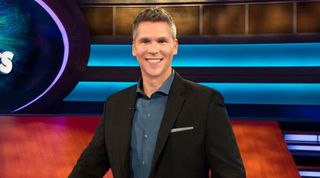The Five Spot: John Henson

TV game shows have a long, rich history, dating back to the beginning of the medium, and the form has produced winners among its hosts as well. And the genre has, to say the least, been pretty good to John Henson, who spent seven years producing and cohosting Wipeout, the ABC show centered on gutsy (or crazy) contestants competing in the “world’s largest” obstacle course. This summer, Henson, whose first big exposure came hosting E!’s Talk Soup, is giving the format another go — albeit this time hosting a show focused on mind rather than body. iWitness, which debuted on select Fox O&Os July 10 for a six-week test run, tests contestants’ powers of observation by asking them to recall what they’ve just witnessed in video clips and images. Henson spoke with B&C contributing editor Diana Marszalek about the art of game show hosting, the format’s iconic personalities and the idea that he is “much better suited to hosting than being a contestant.” An edited transcript follows.
Stars such as Monty Hall and Bob Barker built legendary careers as game show hosts. What’s it take?
[Iconic game show hosts] have their own unique personality and vantage point. But what you want to do is put the people playing the game at ease, and have enough fun that it translates to an audience at home. It also requires a unique combination of skills that draw on all areas of my background [including] standup comedy. A lot of hosting is improvisation and being in the moment with contestants.
How does that apply to iWitness?
One of things that makes iWitness a compelling format is that it’s a very easy game to grasp, and for the home viewer to challenge themselves to see what they can remember. That’s what we would call ‘play along with,’ which is a hallmark of every iconic game show — the ability to watch and enjoy with the contestant and also be challenged.
Contestants have also always been part of game show fandom. Think early Newlywed Game couples, or Wipeout players. No doubt you’ve seen your share of characters.
With Wipeout, our contestants were a selection of borderline personalities, where we were peeling people off the ceiling. You had to have a bit of a screw loose to look at that course and say you want to do that. And the only winner on Wipeout was gravity. If you were experiencing success on the Wipeout course, we were not doing our job. I was also always struck by how many people approached me and said they just wanted to run the obstacle course, that they didn’t need to be on the show. That is a level of masochism I can’t relate to — like putting your hand in the slicer and saying, ‘Look at what I’m doing.’
What about iWitness? How do you spot a potential winner for that one?
On iWitness, we have people from all walks. It’s fun because there is no way to sort of profile who is going to be successful on the show, and it’s fascinating what people retain and what they don’t. They also have a talent that I don’t have. I read Teleprompters. It’s all a matter of perspective of what frightens people and what doesn’t, but I would be a nervous wreck if I were a contestant.
Between the game shows and Talk Soup earlier in your career, it seems like you’ve had some pretty good times doing TV.
When I was doing Talk Soup, and people would ask if ‘you guys are having as much fun as you like you’re having,’ my standard answer would be, ‘We are having more fun.’ I didn’t realize how good I had it — absolutely no supervision, we just did what we wanted. I have been very fortunate in my career and lucky enough to be part of impactful shows over the years.
Broadcasting & Cable Newsletter
The smarter way to stay on top of broadcasting and cable industry. Sign up below
